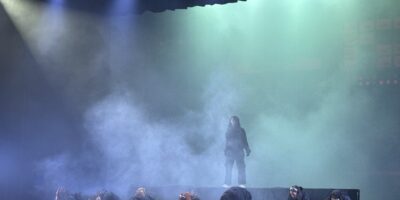“There is a fifth dimension, beyond that which is known to man. It is a dimension as vast as space and as timeless as infinity. It is the middle ground between light and shadow, between science and superstition, and it lies between the pit of man’s fears and the summit of imagination. It is an area which we call The Twilight Zone”.
Enter Rod Serling: a man who has by all means been a defining force in the genres of science-fiction and the supernatural. In its six years on the air, the original Twilight Zone was a powerful force and unlike anything that had ever been done before it. Serling is a born story-teller and his skill is evident through his expert narration on the show. If you think you’ve never seen The Twilight Zone you’re probably wrong. It has been an endless source of inspiration for science-fiction for decades, notably for featuring young future Star Trekkers William Shatner, Leonard Nimoy and George Takei, and being featured on The Simpson’s, whose writers have payed homage to the series countless times in their annual Treehouse of Horror Halloween specials (“Terror at 5 feet” is my personal favourite; Bart’s acting far surpasses the young William Shatner’s).
Watching it today, The Twilight Zone has not only been a middle ground between light and shadow or science and superstition, but also between brilliance and ridiculousness. There are episodes which really explore the horrors of isolation or take on the social problems of racism like “Where is Everybody” and “The Encounter”, but then there are also absurd plot lines like aliens giving a man superpowers in “Mr. Dingle the Strong” or a man’s love for his mother turning him into a little boy in “Young Man’s Fancy”. The plots are ambitious: the themes grandiose and writing liberal with monologues. Rod Serling is right when he describes the shows as television plays: the show often feels like a filmed stage-production. I think that what prevents The Twilight Zone from just being cheesy is the fact that the show feels so earnest. The carefully cued music, the use of light and shadow in filming and the quality of writing surmounts to storytelling at its best.
I believe that all great episodes of The Twilight Zone are about what it means to be human. They address the ideas of power-lust, corruption, fear, the soul, and death. In my opinion the best episodes of The Twilight Zone center on the ideas of being trapped, alone, or abandoned: what it means to be human independent of society. This has been done many times in many different ways. Sometimes the central character is all by themselves, sometimes with neighbours; people may find themselves no longer like those around them or having literally no one around them. On Halloween people take the idea of the spooky and the haunted to be about donning a mask or facing a great foreign unknown. The Twilight Zone told such effective ghost stories because they took off masks and demonstrated how little we know about that with which we’re allegedly most intimate. So it is my sincere recommendation to give the series a chance and see for yourself what it is that lies in the twilight zone.




Leave a Reply